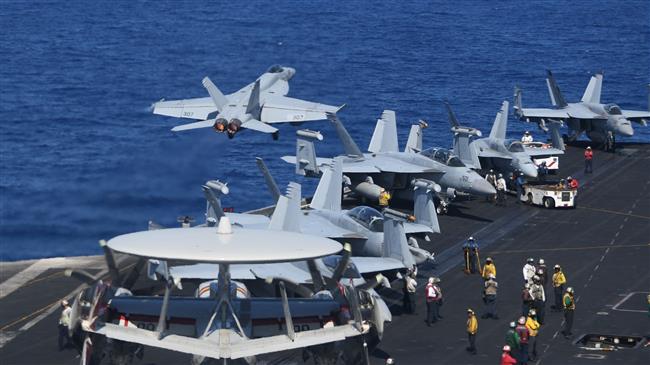US, not China, militarizing South China Sea: Analyst
China is very concerned about the US military buildup in the South China Sea as every invasion attempt against Chinese territory has come through that region, says an author and political analyst.
The White House accused China of militarizing the South China Sea on Thursday, following reports that Beijing has installed missiles on three outposts in the hotly contested region.
Press Secretary Sarah Huckabee Sanders warned that “there will be near-term and long-term consequences” in response to the reported military buildup in the South China Sea.
“I don’t think there are any serious consequences even being contemplated,” Mike Billington, Asia editor for the Executive Intelligence Review, said in an interview. “This is just the way the Trump administration talks about these things.”
“It’s rather ironic that they are accusing China of militarizing the South China Sea, when it’s primarily the US and occasionally some of their so-called allies who have been regularly sending warships and aircraft carriers and all kinds of military hardware into the South China Sea,” Billington added.
The Chinese have many concerns about strategically defending the South China Sea because “every invasion of their nation has come through the South China Sea,” he noted.
Citing sources with knowledge of US intelligence, CNBC News reported on Wednesday that China had installed anti-ship cruise missiles and surface-to-air missile systems on three of its fortified outposts in the South China Sea.
The US has stepped up its military presence in the South China Sea under the pretext of freedom of navigation operations in international waters.
Experts studying China cite these operations as a reason behind China’s deployment of defensive facilities in the region.
“Almost all of the trade that goes through the South China Sea is with China, so they have the primary concern about the freedom of navigation rather than the United States,” Billington pointed out.
The South China Sea serves as a gateway to global sea routes, though which about $3.4 trillion of trade passes each year. Vietnam, Taiwan, the Philippines, Malaysia, and Brunei have overlapping claims with China to parts of the sea.
Despite its tough line in negotiations, Billington said the Trump administration is closely working with China to resolve issues like trade and North Korea.
A potential breakthrough in the North Korean nuclear standoff is around the corner because “people were afraid that Trump and Kim John-un were about to start a war,” he said. “I insist he (Trump) was not planning to start a war, that’s just he’s way of negotiating.”
The North Korean leader has now “a basis for trusting that Trump will not invade” his country– as the US did under George W. Bush and Barack Obama in Iraq and Libya – because the US president is working with Russia and China.
President Trump said Friday that the date and location of his unprecedented meeting with North Korea’s Kim had been set and would soon be announced.
VIDEO | Press TV's news headlines
VIDEO | American, Israeli rabbis call for ceasefire during protest near Gaza
Iran calls for enhanced defense cooperation with Russia
US campus crackdown: 500 pro-Palestinian protesters arrested
VIDEO | Yemenis rally in Sana'a in solidarity with Palestinians in Gaza
VIDEO | Jordanians march after Friday prayers in support of Palestinians
Far-right Israeli minister Ben-Gvir injured
Germany clears pro-Gaza camp as US-style demos spread across Europe












 This makes it easy to access the Press TV website
This makes it easy to access the Press TV website